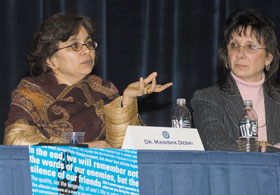  |
| HOME | THIS ISSUE | CALENDAR | GRANTS | BACK ISSUES | < BACK | NEXT > |
Martin Luther King panel explores issues of social injustice
by Sherry Fisher - February 4, 2008
|
||||
| Until the relationship between the powerless and the powerful is changed, the struggle for civil rights for all will remain unfinished, according to Manisha Desai.
Desai, director of the Women’s Studies Program, spoke during a panel about Martin Luther King Jr. on Jan. 30 in the Student Union Theatre. The event was sponsored by the Office of the Vice Provost for Multicultural and International Affairs. Vice Provost Ronald Taylor, a sociology professor, moderated the panel that included Desai, Davita Glasberg, head of the sociology department, and associate professor of history Jeffrey Ogbar, director of the Institute for African American Studies. Desai, who grew up in India, drew parallels between Martin Luther King Jr. and Mahatma Gandhi. "When I was becoming politicized and radicalized in the 1960s, [Mahatma] Gandhi was no longer someone who was a hero. He was seen as someone who had sold out.” Now, there is a resurgence of interest in Gandhi, she said. “Part of that has come from seeing him as a visionary, rather than a political leader. I think as a political leader he failed at some of the strategies. In retrospect, they weren’t appropriate for India.” Desai said that both Gandhi and King “radicalized” the way people protested. They believed in non-violent protest and consistency between ends and means, and focused on the relationship between the powerless and the powerful. For both Gandhi and King, that relationship had to be redefined, she said: “Martin Luther King talked about it in terms of love for thy enemy, and Gandhi talked about a change of heart. “King believed in the redemptive power of love,” Desai added. “It was through loving that one could transform the relationship and continue the work of social justice and continue the revolution. He said to look at the good in the enemy: instead of trying to defeat the individual, try to defeat the system.” Glasberg discussed economic justice, racism, and human rights. “While the more blatant and violent expressions of racism and denial of economic rights have perhaps gone underground, the more subtle current expressions are no less powerful in reproducing racially based and institutionalized denial of economic justice,” she said. “One recent and glaring example of this can be found in the growing problem of predatory lending.” Glasberg said owning a home “is the key element of wealth acquisition and accumulation for most people. Denial of an opportunity to accumulate wealth means an inability to finance the education of one’s children, or to invest in business, or purchase a home that in later years becomes a multiplier of further wealth and advantage.” She added, “Historical discrimination has snowballed into contemporary economic injustice. Research has shown that not all returning soldiers after World War II had equal opportunities under the Federal Housing Act. People of color were repeatedly denied those loans.” That trend continues, she maintained. “Even today, the General Accounting Office in Washington has noted that African American families are far more likely to be turned down for a mortgage than white families, regardless of their income,” Glasberg said. Black Americans and the poor are often victims of predatory lending she said: “It carries terms that are far more punitive than those that are applied to prime lending. It attacks and erodes the equity position of the borrower, rather than help them build equity.” Ogbar said that many people have a “very narrow, myopic understanding” of Martin Luther King and the civil rights movement. “Most Americans unfortunately, get a very sanitized version of what civil rights was about,” he said. “It’s not just about using different water fountains or sitting in different parts of the bus. These were the most innocuous forms of all the challenges the people faced at the time. "These were the least of their concerns. They were concerned about terrorism, people being blown up, not being able to get jobs, and hospitals turning them away because they weren’t white.” He said King’s message “becomes much more salient when you consider the violent forces they were up against.” |
| ADVANCE HOME UCONN HOME |

